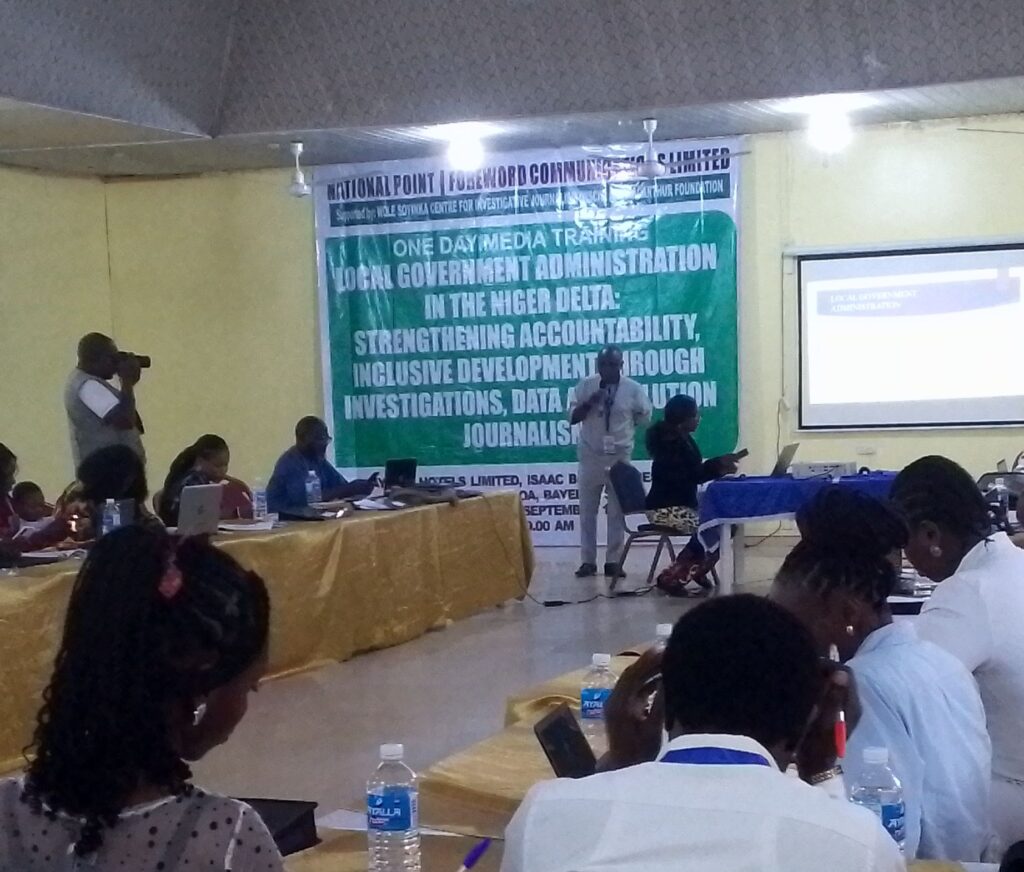The need for practicing journalists in Nigeria to latch into the social media space with their professional skills to rescue the industry from novices in order to ensure reliability and credibility of news items dish out to the populace have been stressed.
This were the submissions of stakeholders in the media industry at a one-day media training organized by National Point/ Foreword Communications Limited, the MacArthur Foundation, and the Wole Soyinka Center for Investigative Journalism, held in Bayelsa State.
The capacity building with its theme “Local Government Administration in the Niger Delta: Strengthening Accountability and Inclusive Development through Investigations, Data, and Solution Journalism.” was held in Yenagoa, the Bayelsa State capital.
In a welcome address, a seasoned journalist, Ms. Ibiba Donpedro, encouraged practicing journalists to adhere strictly to the ethics of the profession.
Reminiscing the hurdles she faced as an investigative reporter with a leading national newspaper, Miss Donpedro, noted that She surmounted them through
determination and hard work.
The 2003 CNN Best African Reporter of the Year, encouraged practicing journalists to strive for justice, equity as well as a balance in their reportage.
Speaking on the topic “Community Development and Accountability in Local Government, a resource person, Professor Steve Wordu
urged members of the pen fraternity to cease the opportunity of a the training to equip themselves digitally by dishing out accurate and balance stories.
Professor Wordu, charged journalists to demonstrate their skills by dishing only news that are true in their entirety thereby making the audience to stay with their platforms.
Presenting paper titled “Data assisted reporting for investigative, inclusive and accountable governance, another keynote speaker, Mr Sunny Dada, noted that members of the pen pushers can track the income and expenditure of government through policy paper, audit reports, official government website, zonal meeting and freedom of information among others.
Mr Dada, advocated for the use of “Leaks NG” a website operated by all national dailies, to report any unwholesome practice in their various localities stating that their safety is guaranteed by the website.
Dwelling on “Investigative reporting tools to enhance exclusivity and accountable governance” another resource person, Dr Judex Okoro, urged media professionals to make use of investigative journalism which involved in-depth work in trying or unravel corruption.
Dr Okoro, highlighted some of the purpose of investigative journalism to include, pursuit of stories of public interest, reveal the truth by rooting out facts, fight against exploitation and illegal practice, ensure justice prevail and produce new information among others.
Speaking on Gender reporting and inclusivity, Chief Constance Meju, urged participants to view gender in the perspective of both gender.
Chief Meju, who lamented that gender has weakened and deprived women from their rights, noted that only gender equality can guarantee a meaningful development.
The gender equality advocate, advised journalists to be balance in their reportage.
The question and answer session climaxed the one-day capacity building programme for practicing journalist drawn from Akwa-Ibom, Cross Rivers Bayelsa and Rivers States.
